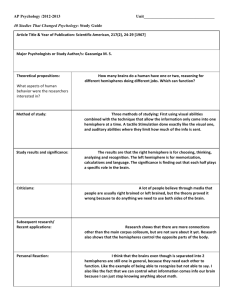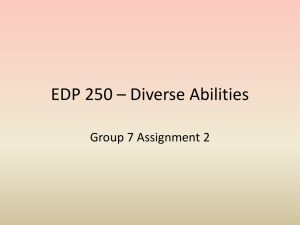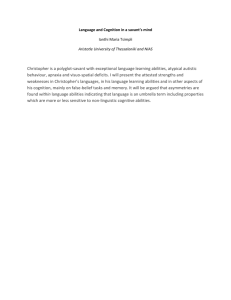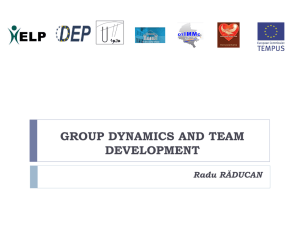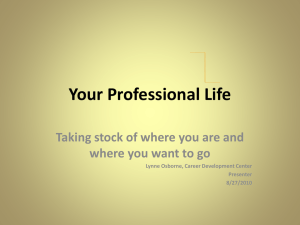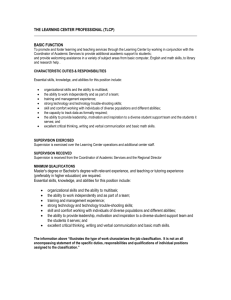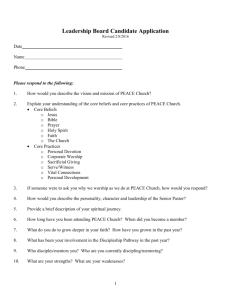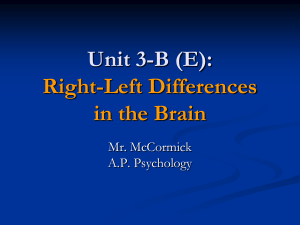Revenge of the Right Brain
advertisement
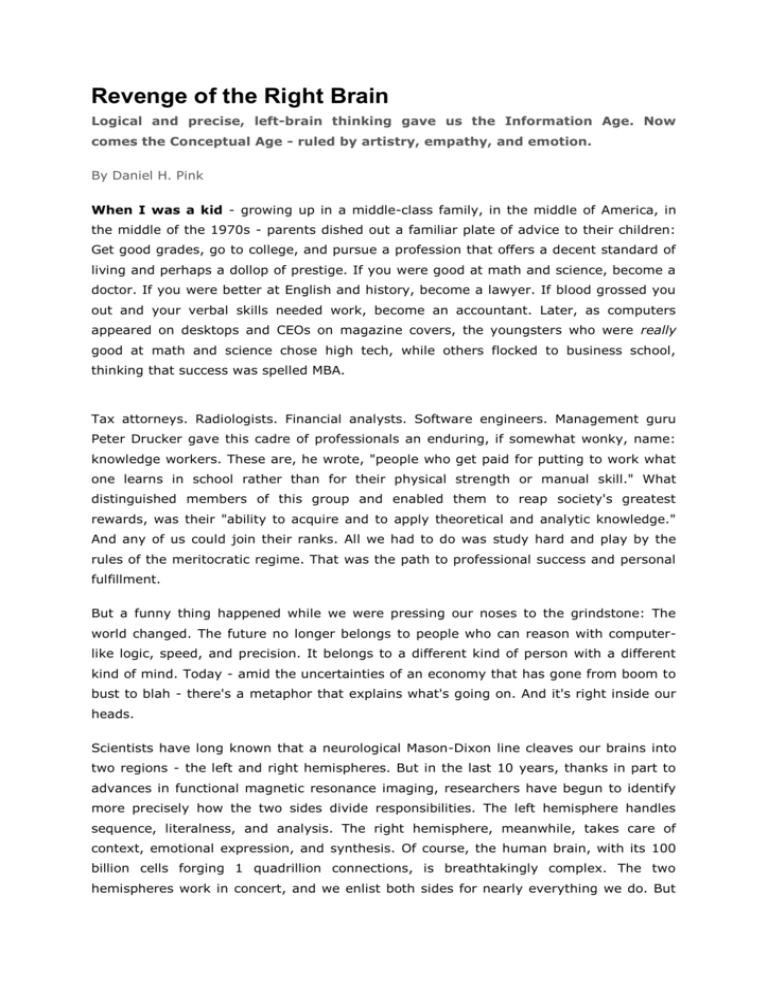
Revenge of the Right Brain Logical and precise, left-brain thinking gave us the Information Age. Now comes the Conceptual Age - ruled by artistry, empathy, and emotion. By Daniel H. Pink When I was a kid - growing up in a middle-class family, in the middle of America, in the middle of the 1970s - parents dished out a familiar plate of advice to their children: Get good grades, go to college, and pursue a profession that offers a decent standard of living and perhaps a dollop of prestige. If you were good at math and science, become a doctor. If you were better at English and history, become a lawyer. If blood grossed you out and your verbal skills needed work, become an accountant. Later, as computers appeared on desktops and CEOs on magazine covers, the youngsters who were really good at math and science chose high tech, while others flocked to business school, thinking that success was spelled MBA. Tax attorneys. Radiologists. Financial analysts. Software engineers. Management guru Peter Drucker gave this cadre of professionals an enduring, if somewhat wonky, name: knowledge workers. These are, he wrote, "people who get paid for putting to work what one learns in school rather than for their physical strength or manual skill." What distinguished members of this group and enabled them to reap society's greatest rewards, was their "ability to acquire and to apply theoretical and analytic knowledge." And any of us could join their ranks. All we had to do was study hard and play by the rules of the meritocratic regime. That was the path to professional success and personal fulfillment. But a funny thing happened while we were pressing our noses to the grindstone: The world changed. The future no longer belongs to people who can reason with computerlike logic, speed, and precision. It belongs to a different kind of person with a different kind of mind. Today - amid the uncertainties of an economy that has gone from boom to bust to blah - there's a metaphor that explains what's going on. And it's right inside our heads. Scientists have long known that a neurological Mason-Dixon line cleaves our brains into two regions - the left and right hemispheres. But in the last 10 years, thanks in part to advances in functional magnetic resonance imaging, researchers have begun to identify more precisely how the two sides divide responsibilities. The left hemisphere handles sequence, literalness, and analysis. The right hemisphere, meanwhile, takes care of context, emotional expression, and synthesis. Of course, the human brain, with its 100 billion cells forging 1 quadrillion connections, is breathtakingly complex. The two hemispheres work in concert, and we enlist both sides for nearly everything we do. But the structure of our brains can help explain the contours of our times. Until recently, the abilities that led to success in school, work, and business were characteristic of the left hemisphere. They were the sorts of linear, logical, analytical talents measured by SATs and deployed by CPAs. Today, those capabilities are still necessary. But they're no longer sufficient. In a world upended by outsourcing, deluged with data, and choked with choices, the abilities that matter most are now closer in spirit to the specialties of the right hemisphere - artistry, empathy, seeing the big picture, and pursuing the transcendent. Beneath the nervous clatter of our half-completed decade stirs a slow but seismic shift. The Information Age we all prepared for is ending. Rising in its place is what I call the Conceptual Age, an era in which mastery of abilities that we've often overlooked and undervalued marks the fault line between who gets ahead and who falls behind. To some of you, this shift - from an economy built on the logical, sequential abilities of the Information Age to an economy built on the inventive, empathic abilities of the Conceptual Age - sounds delightful. "You had me at hello!" I can hear the painters and nurses exulting. But to others, this sounds like a crock. "Prove it!" I hear the programmers and lawyers demanding. OK. To convince you, I'll explain the reasons for this shift, using the mechanistic language of cause and effect. The effect: the scales tilting in favor of right brain-style thinking. The causes: Asia, automation, and abundance. Asia Few issues today spark more controversy than outsourcing. Those squadrons of whitecollar workers in India, the Philippines, and China are scaring the bejesus out of software jockeys across North America and Europe. According to Forrester Research, 1 in 9 jobs in the US information technology industry will move overseas by 2010. And it's not just tech work. Visit India's office parks and you'll see chartered accountants preparing American tax returns, lawyers researching American lawsuits, and radiologists reading CAT scans for US hospitals. The reality behind the alarm is this: Outsourcing to Asia is overhyped in the short term, but underhyped in the long term. We're not all going to lose our jobs tomorrow. (The total number of jobs lost to offshoring so far represents less than 1 percent of the US labor force.) But as the cost of communicating with the other side of the globe falls essentially to zero, as India becomes (by 2010) the country with the most English speakers in the world, and as developing nations continue to mint millions of extremely capable knowledge workers, the professional lives of people in the West will change dramatically. If number crunching, chart reading, and code writing can be done for a lot less overseas and delivered to clients instantly via fiber-optic cable, that's where the work will go. But these gusts of comparative advantage are blowing away only certain kinds of whitecollar jobs - those that can be reduced to a set of rules, routines, and instructions. That's why narrow left-brain work such as basic computer coding, accounting, legal research, and financial analysis is migrating across the oceans. But that's also why plenty of opportunities remain for people and companies doing less routine work - programmers who can design entire systems, accountants who serve as life planners, and bankers expert less in the intricacies of Excel than in the art of the deal. Now that foreigners can do left-brain work cheaper, we in the US must do right-brain work better. Last century, machines proved they could replace human muscle. This century, technologies are proving they can outperform human left brains - they can execute sequential, reductive, computational work better, faster, and more accurately than even those with the highest IQs. (Just ask chess grandmaster Garry Kasparov.) Consider jobs in financial services. Stockbrokers who merely execute transactions are history. Online trading services and market makers do such work far more efficiently. The brokers who survived have morphed from routine order-takers to less easily replicated advisers, who can understand a client's broader financial objectives and even the client's emotions and dreams. Or take lawyers. Dozens of inexpensive information and advice services are reshaping law practice. At CompleteCase.com, you can get an uncontested divorce for $249, less than a 10th of the cost of a divorce lawyer. Meanwhile, the Web is cracking the information monopoly that has long been the source of many lawyers' high incomes and professional mystique. Go to USlegalforms.com and you can download - for the price of two movie tickets - fill-in-the-blank wills, contracts, and articles of incorporation that used to reside exclusively on lawyers' hard drives. Instead of hiring a lawyer for 10 hours to craft a contract, consumers can fill out the form themselves and hire a lawyer for one hour to look it over. Consequently, legal abilities that can't be digitized - convincing a jury or understanding the subtleties of a negotiation - become more valuable. Even computer programmers may feel the pinch. "In the old days," legendary computer scientist Vernor Vinge has said, "anybody with even routine skills could get a job as a programmer. That isn't true anymore. The routine functions are increasingly being turned over to machines." The result: As the scut work gets offloaded, engineers will have to master different aptitudes, relying more on creativity than competence. Any job that can be reduced to a set of rules is at risk. If a $500-a-month accountant in India doesn't swipe your accounting job, TurboTax will. Now that computers can emulate left-hemisphere skills, we'll have to rely ever more on our right hemispheres. Abundance Our left brains have made us rich. Powered by armies of Drucker's knowledge workers, the information economy has produced a standard of living that would have been unfathomable in our grandparents' youth. Their lives were defined by scarcity. Ours are shaped by abundance. Want evidence? Spend five minutes at Best Buy. Or look in your garage. Owning a car used to be a grand American aspiration. Today, there are more automobiles in the US than there are licensed drivers - which means that, on average, everybody who can drive has a car of their own. And if your garage is also piled with excess consumer goods, you're not alone. Self-storage - a business devoted to housing our extra crap - is now a $17 billion annual industry in the US, nearly double Hollywood's yearly box office take. But abundance has produced an ironic result. The Information Age has unleashed a prosperity that in turn places a premium on less rational sensibilities - beauty, spirituality, emotion. For companies and entrepreneurs, it's no longer enough to create a product, a service, or an experience that's reasonably priced and adequately functional. In an age of abundance, consumers demand something more. Check out your bathroom. If you're like a few million Americans, you've got a Michael Graves toilet brush or a Karim Rashid trash can that you bought at Target. Try explaining a designer garbage pail to the left side of your brain! Or consider illumination. Electric lighting was rare a century ago, but now it's commonplace. Yet in the US, candles are a $2 billion a year business - for reasons that stretch beyond the logical need for luminosity to a prosperous country's more inchoate desire for pleasure and transcendence. Liberated by this prosperity but not fulfilled by it, more people are searching for meaning. From the mainstream embrace of such once-exotic practices as yoga and meditation to the rise of spirituality in the workplace to the influence of evangelism in pop culture and politics, the quest for meaning and purpose has become an integral part of everyday life. And that will only intensify as the first children of abundance, the baby boomers, realize that they have more of their lives behind them than ahead. In both business and personal life, now that our left-brain needs have largely been sated, our right-brain yearnings will demand to be fed. As the forces of Asia, automation, and abundance strengthen and accelerate, the curtain is rising on a new era, the Conceptual Age. If the Industrial Age was built on people's backs, and the Information Age on people's left hemispheres, the Conceptual Age is being built on people's right hemispheres. We've progressed from a society of farmers to a society of factory workers to a society of knowledge workers. And now we're progressing yet again - to a society of creators and empathizers, pattern recognizers, and meaning makers. But let me be clear: The future is not some Manichaean landscape in which individuals are either left-brained and extinct or right-brained and ecstatic - a land in which millionaire yoga instructors drive BMWs and programmers scrub counters at Chick-fil-A. Logical, linear, analytic thinking remains indispensable. But it's no longer enough. To flourish in this age, we'll need to supplement our well-developed high tech abilities with aptitudes that are "high concept" and "high touch." High concept involves the ability to create artistic and emotional beauty, to detect patterns and opportunities, to craft a satisfying narrative, and to come up with inventions the world didn't know it was missing. High touch involves the capacity to empathize, to understand the subtleties of human interaction, to find joy in one's self and to elicit it in others, and to stretch beyond the quotidian in pursuit of purpose and meaning. Developing these high concept, high touch abilities won't be easy for everyone. For some, the prospect seems unattainable. Fear not (or at least fear less). The sorts of abilities that now matter most are fundamentally human attributes. After all, back on the savannah, our caveperson ancestors weren't plugging numbers into spreadsheets or debugging code. But they were telling stories, demonstrating empathy, and designing innovations. These abilities have always been part of what it means to be human. It's just that after a few generations in the Information Age, many of our high concept, high touch muscles have atrophied. The challenge is to work them back into shape. Want to get ahead today? Forget what your parents told you. Instead, do something foreigners can't do cheaper. Something computers can't do faster. And something that fills one of the nonmaterial, transcendent desires of an abundant age. In other words, go right, young man and woman, go right. Adapted from A Whole New Mind: Moving from the Information Age to the Conceptual Age, copyright �by Daniel H. Pink, to be published in March by Riverhead Books. Printed with permission of the publisher. Contributing editor Daniel H. Pink (dp@danpink.com) wrote about Gross National Happiness in issue 12.12.
